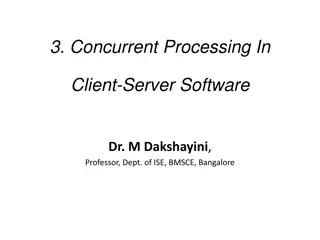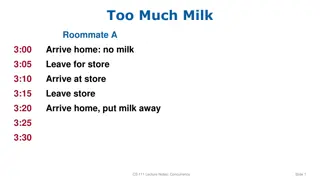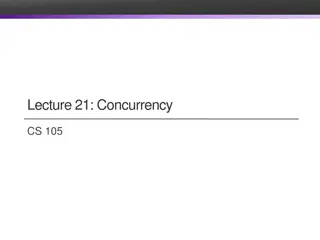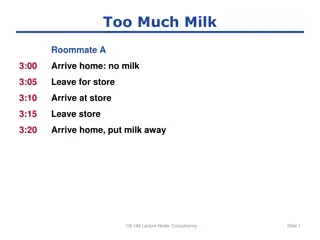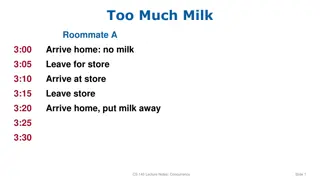
Understanding Concurrency Concepts in Computer Systems
"Explore the fundamentals of concurrency in computer systems, including the difference between sequential and concurrent programs, operating system handling, context switching, and the advantages of using threads over processes. Discover the importance of concurrency for performance enhancements and real-world applications."
Download Presentation

Please find below an Image/Link to download the presentation.
The content on the website is provided AS IS for your information and personal use only. It may not be sold, licensed, or shared on other websites without obtaining consent from the author. Download presentation by click this link. If you encounter any issues during the download, it is possible that the publisher has removed the file from their server.
E N D
Presentation Transcript
COS 316 Precept: Concurrency 1
Todays Plan Background on concurrency Key Golang mechanisms for developing concurrent programs (used in assignment 5)
Background: Overview of Concurrency Sequential programs: Single thread of control Subprograms / tasks - don t overlap in time - executed one after another Concurrent programs Multiple threads of control Subprograms / tasks - may (conceptually) overlap in time - (appear to be) executed at the same time Computer with a single processor can have multiple processes at once OS schedules different processes - giving illusion that multiple processes are running simultaneously Note - parallel architectures can have N processes running simultaneously on N processors
Background: Operating System (Review) Allows many processes to execute concurrently Ensures each process physical address space does not overlap Ensures all processes get fair share of processor time and resources Processes can run concurrently and (context) switch User's perspective: appears that processes run in parallel although they don't
Background: Context Switch Control flow changes from one process to another E.g., switching from processA to processB Overhead: Before each switch OS has to save the state (context) of currently running process and restore it when next time its execution gets resumed
Background: Threads vs Processes Processes Process context switching time is long (change of virtual address space & other resources) Threads thread is a lightweight process thread shares some of the context with other threads in a process, e.g. Virtual memory File descriptors Private context for each thread: Stack Data registers Code (PC) Switching between threads is faster because there is less context less data that has to be read/written from/to memory
Background: Why Concurrency? Performance gain Google search queries Application throughput Throughput = amount of work that a computer can do in a given time period When one task is waiting (blocking) for I/O another task can continue its execution Model real-world structures Multiple sensors Multiple events Multiple activities
Tradeoffs - Concurrent Programming Complex Error-prone Hard to debug
Example Jesse Alex Bank Account 100 Read b = 100 b = b + 10 Write b = 110 110 Read b = 110 b = b + 10 Write b = 120 120 time
Example Jesse Alex Bank Account 100 Read b = 100 Read b = 100 b = b + 10 Write b = 110 110 b = b + 10 Write b = 110 110 time
Go and Concurrency Goroutines The sync package - https://golang.org/pkg/sync sync.Mutex sync.Cond
Goroutines A lightweight thread managed by the Go runtime Many goroutines execute within a single OS thread One goroutine is created automatically to execute the main() Other goroutines are created using the go keyword Order of execution depends on the Go scheduler Go takes a process with main thread and schedules / switches goroutines within that thread Compare Sequential Program https://play.golang.org/p/PLeCGtRp2QB Concurrent program https://play.golang.org/p/sDitCEr_3vX
Goroutines - Exiting goroutine exits when code associated with its function returns When the main goroutine is complete, all other goroutines exit, even if they are not finished goroutines are forced to exit when main goroutine exits goroutine may not complete its execution because main completes early Execution order of goroutines is non-deterministic
A simple example to show non-determinism https://play.golang.org/p/sDitCEr_3vX Switch the order of the calls from go say("world") say("hello") say("hello") go say("world") What happens? How to fix?
Synchronization Synchronization is when multiple threads agree on a timing of an event Global events whose execution is viewed by all threads, simultaneously One goroutine does not know the timing of other goroutines Synchronization can introduce some global events that every thread sees at the same time
Synchronization and Go type Cond Func (*Cond) Signal() func (*Cond) Broadcast() func (*Cond) Wait() type Mutex func (m *Mutex) Lock() func (m *Mutex) Unlock() Channels See COS 418
Mutex (Mutual Exclusion) Sharing variables between goroutines (concurrently) can cause problems Two goroutines writing to the same shared variable can interfere with each other Function/goroutine is said to be concurrency-safe if can be executed concurrently with other goroutines without interfering improperly with them e.g., it will not alter variables in other goroutines in some unexpected/unintended/unsafe way
Sync.Mutex A mutex ensures mutual exclusion Uses a binary semaphore If flag is up shared variable is in use by somebody Only one goroutine can write into variable at a time Once goroutine is done with using shared variable it has to put the flag down if flag is down shared variable is available If another goroutine see that flag is down it knows it can use the shared variable but first it has to put the flag up
Back to our example Jesse Alex Bank Account func Deposit(amount) { } 100 lock balanceLock read balance balance amount write balance unlock balanceLock Read b = 100 CRITICAL SECTION Read b = = balance + b = b + 10 Write b = 110 110 = 110 } b = b + 10 Write b = 120 120 time
Sync.Mutex Create a Mutex var mut sync.Mutex Lock() Puts the flag up (if none of other goroutines has already put the flag up) If second goroutine also calls Lock()it will be blocked, it has to wait until first goroutine releases the lock Note - any number of goroutines (not just two) competing to Lock() Unlock() Puts the flag down When Unlock() is called, a blocked Lock() can proceed In general: put Lock() at the beginning of the critical section and call Unlock() at the end of it; ensures that only one goroutine will be in critical section region To lock a critical section mut.Lock() To unlock a critical section mut.Unlock()
Mutex Exercise Consider: var i int = 0 var wg sync.WaitGroup func inc() { i = i + 1 wg.Done() } func main() { wg.Add(2) go inc() go inc() wg.Wait() fmt.Println(i) } Run the program https://play.golang.org/p/hNevYkKDp30 Is it concurrency-safe? Use Lock() and Unlock() to make these programs concurrency-safe
Mutex Exercise - Bank Account Jesse Alex Bank Account 100 Read b = 100 Make this code concurrency-safe Read b = b = b + 10 Write b = 110 110 https://go.dev/play/p/VboCb85otn0 = 110 b = b + 10 Write b = 120 120 time
Interesting Example Consider: var mu sync.Mutex func funcA() { mu.Lock() funcB() mu.Unlock() } func funcB() { mu.Lock() fmt.Println("Hello, World") mu.Unlock() } func main() { funcA() } Run the program https://play.golang.org/p/c2Qgo-W_4mP What happens?
Condition Variables - sync.Cond sync.Cond type - provides an efficient way to send notifications among goroutines Mutex or RWMutex sync.Cond value holds a sync.Locker field with name L - field value is of type *sync.Mutex or *sync.RWMutex E.g.: cond := sync.NewCond(&sync.Mutex{}) cond.L.Lock() cond.L.UnLock() L sync.Cond value holds a FIFO queue of waiting goroutines commonly used to allow threads to wait on a condition to be true: consumers wait until a producer signals that something happened 24
Condition Variables - L.Lock(), L.Unlock(), Wait(), Broadcast(), Signal() cond := sync.NewCond(&sync.Mutex{}) Call L.Lock() before Wait() Insert calling goroutine in queue and block (wait) Calls L.Unlock() cond.L.Lock() cond.Wait() Unblock all the goroutines in (and remove them from) the waiting goroutine queue Blocked routines go back to running state Invokes cond.L.Lock() (in the resumed cond.Wait() call) to try to acquire and hold the lock cond.L again cond.Wait() call exits after the cond.L.Lock() call returns cond.Broadcast() Unblock the head goroutine in (and remove them from) the waiting goroutine queue cond.Signal() 25
sync.Cond - Always Check the Condition! checkCondition := func() bool { // Check the condition } Why is this loop here? cond.Wait() does not guarantee the condition holds when it returns for !checkCondition() { cond.Wait() } cond.L.Unlock() The condition could have been made false again while the goroutine was waiting to run Always check the condition, and keep waiting if it does not hold 27




